Report
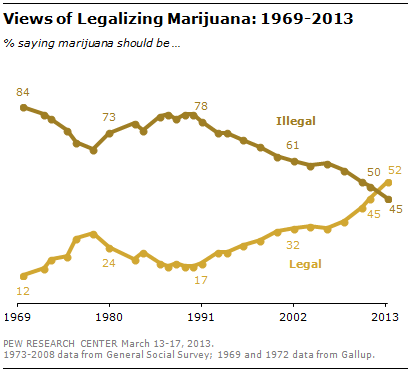
For the first time in more than four decades of polling on the issue, a majority of Americans favor legalizing the use of marijuana. A national survey finds that 52% say that the use of marijuana should be made legal while 45% say it should not.
Support for legalizing marijuana has risen 11 points since 2010. The change is even more dramatic since the late 1960s. A 1969 Gallup survey found that just 12% favored legalizing marijuana use, while 84% were opposed.

The survey by the Pew Research Center, conducted March 13-17 among 1,501 adults, finds that young people are the most supportive of marijuana legalization. Fully 65% of Millennials –born since 1980 and now between 18 and 32 – favor legalizing the use of marijuana, up from just 36% in 2008. Yet there also has been a striking change in long-term attitudes among older generations, particularly Baby Boomers.
Half (50%) of Boomers now favor legalizing marijuana, among the highest percentages ever. In 1978, 47% of Boomers favored legalizing marijuana, but support plummeted during the 1980s, reaching a low of 17% in 1990. Since 1994, however, the percentage of Boomers favoring marijuana legalization has doubled, from 24% to 50%.
Generation X, born between 1965 and 1980, came of age in the 1990s when there was widespread opposition to legalizing marijuana. Support for marijuana legalization among Gen X also has risen dramatically – from just 28% in 1994 to 42% a decade later and 54% currently.
The Silent Generation continues to be less supportive of marijuana legalization than younger age cohorts. But the percentage of Silents who favor legalization has nearly doubled –from 17% to 32% – since 2002.

The survey finds that an increasing percentage of Americans say they have tried marijuana. Overall, 48% say they have ever tried marijuana, up from 38% a decade ago. Roughly half in all age groups, except for those 65 and older, say they have tried marijuana.
About one-in-ten (12%) say they have used marijuana in the past year. Age differences are much more pronounced when it comes to the recent use of marijuana: 27% of those younger than 30 say they have used marijuana in the past year, at least three times the percentage in any other age group.
Among those who say they have used marijuana in the past year, 47% say they used it “just for fun,” while 30% say it was for a medical issue; 23% volunteer they used it for medical purposes and also just for fun.
As support for marijuana legalization has grown, there has been a decline in the percentage viewing it as a “gateway drug.” Currently, just 38% agree that “for most people the use of marijuana leads to the use of hard drugs.” In 1977, 60% said its use led to the use of hard drugs.

More recently, there has been a major shift in attitudes on whether it is immoral to smoke marijuana. Currently, 32% say that smoking marijuana is morally wrong, an 18-point decline since 2006 (50%). Over this period, the percentage saying that smoking marijuana is not a moral issue has risen 15 points (from 35% then to 50% today).
Amid changing attitudes about marijuana, a sizable percentage of Americans (72%) say that government efforts to enforce marijuana laws cost more than they are worth. And 60% say that the federal government should not enforce federal laws prohibiting the use of marijuana in states where it is legal. Last fall, voters in two states – Colorado and Washington state – approved the personal use of small amounts of marijuana for recreational use.
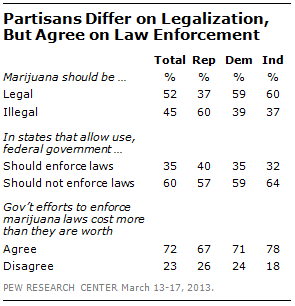
There are partisan differences over legalizing marijuana use and whether smoking marijuana is morally wrong. But Republicans and Democrats have similar views on enforcing marijuana laws: 57% of Republicans and 59% of Democrats say that the federal government should not enforce federal marijuana laws in states that permit its use. Substantial majorities of both Republicans (67%) and Democrats (71%) also say federal enforcement of marijuana laws is not worth the cost.
While Americans increasingly support legalizing marijuana and fewer see its potential dangers, many still do not like the idea of people using marijuana around them. About half (51%) say they would feel uncomfortable if people around them were using marijuana, while 48% would not feel uncomfortable. As with nearly all attitudes about marijuana, there are substantial age differences in discomfort with others using marijuana – 74% of those 65 and older say they would be uncomfortable if people around them used marijuana, compared with 35% of those under 30.
Recent Rise in Support for Legalization
The long-term shift in favor of legalizing marijuana has accelerated in the past three years. About half (52%) of adults today support legalizing the use of marijuana, up from 41% in 2010.
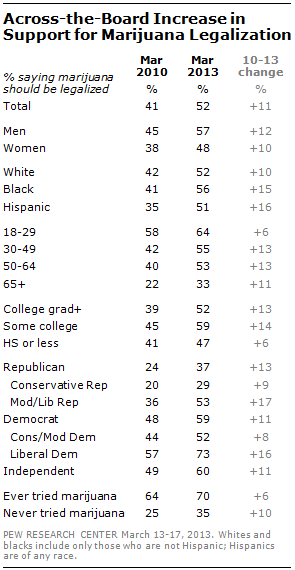
Since then, support for legalization has increased among all demographic and political groups.
Nearly two-thirds of those under 30 (64%) favor legalizing marijuana use, as do about half or more of those 30 to 49 (55%) and 50 to 64 (53%). There is far less support for legalization among those 65 and older (33%); still, there has been an 11-point rise in support among older Americans since 2010.
Men (57%) are somewhat more likely than women (48%) to support marijuana legalization. Support is comparable among racial and ethnic groups — roughly half of whites (52%), blacks (56%) and Hispanics (51%) favor legalizing the use of marijuana.
Only about three-in-ten conservative Republicans (29%) say marijuana use should be legal. Moderate and liberal Republicans are far more likely than conservatives to favor legalization (53%).
Like Republicans, Democrats are ideologically divided over legalizing marijuana. While 73% of liberal Democrats favor legalizing use of marijuana, only about half of conservative and moderate Democrats agree (52%).
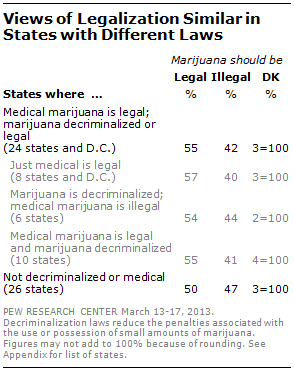
Fully 70% of those who have ever tried marijuana, including 89% of those who have tried it in the past year, say the use of marijuana should be legal. That compares with just 35% of those who have never tried marijuana. Support for legalization has increased since 2010 among those who have ever tried marijuana (by six points) as well as those who have not (by 10 points).
Opinions about legalizing marijuana vary little among states that have more permissive marijuana laws and those that do not. A majority (55%) of those in states that have legalized medical marijuana or have decriminalized (or legalized) marijuana for personal use favor legalizing marijuana. Yet 50% of those in states in which marijuana is not decriminalized (or legal for any purpose) also favor its legalization.
Shifting Attitudes about Marijuana
Over the past three decades, there has been a substantial decline in the percentage saying

that for most people marijuana leads to the use of hard drugs. Just 38% express that view currently; in a 1977 Gallup survey, 60% said marijuana led to the use of hard drugs.
Much of this shift is the result of generational change. In the 1977 survey, most of those in Greatest Generation (76%), born before 1928, accepted the link between marijuana and hard drug use. The generations that have come of age since 1977 – Gen X and Millennials – are far less likely to say that marijuana use leads to the use of hard drugs (36% of Gen X, 31% of Millennials).
Notably, Boomers view this issue in about the same way as they did in 1977, when there was relatively broad support among this age cohort for legalization. Currently, 37% of Boomers say that marijuana use leads to the use of hard drugs; in 1977, 39% expressed this view. Similarly, 60% of Silents currently say that marijuana use leads to the use of hard drugs, which is virtually the same as opinion among this age cohort in 1977 (62%).
Those who have never tried marijuana are much less likely to view marijuana as a gateway to hard drugs than in the 1970s. In 1977, 72% of those who had never tried marijuana said it led to use of hard drugs; today, just half (50%) of those who have never tried it express this view. In 1977, few who had tried marijuana said there was a link to hard drugs (19%); that remains the case today (26%).
Most Say Marijuana Has Medical Uses
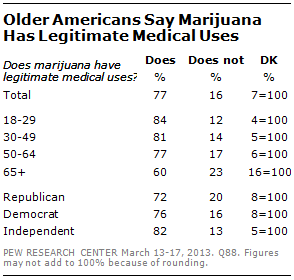
Opinions also have changed about whether marijuana has legitimate medical uses. By 77% to 16%, most say that marijuana does have legitimate medical uses. In an ABC News survey in 1997, a smaller majority (58%) said it had legitimate medical uses, while 34% said it did not.
There are only modest partisan differences in views of the medical uses of marijuana: 82% of independents, 76% of Democrats and 72% of Republicans say it has legitimate medical uses. Age is also a factor in these views, but even among those 65 and older – who oppose legalizing marijuana use by nearly two-to-one – a majority (60%) says that marijuana has legitimate medical uses.

The percentage of Americans who say that smoking marijuana is morally wrong also has declined dramatically since 2006. A survey earlier this year found that 32% of Americans say that smoking marijuana is morally wrong, down 18 points since 2006. Over the same period, the percentage saying it is not a moral issue has increased by 15 points (from 35% to 50%).

As with many of the changes in opinions about marijuana and its use, the decline in the percentages who think that smoking marijuana is morally wrong has occurred across most demographic and political groups.
Those in the Silent Generation are more likely than younger people to say that smoking marijuana is morally wrong. But since 2006, the percentage of Silents expressing this view has decreased from 71% to 48%.
Federal Enforcement of Marijuana Laws
Nearly three-quarters of Americans (72%) say that in general, government efforts to enforce marijuana laws cost more than they are worth. And when it comes to the question of whether
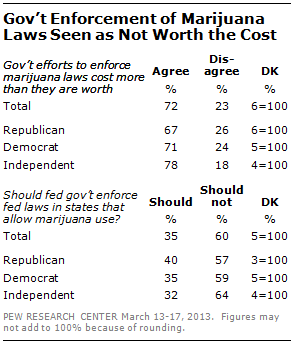
the federal government should enforce marijuana laws in states that have approved marijuana use, a majority (60%) says it should not.
There is agreement across partisan and demographic groups that federal government enforcement of marijuana laws is not worth the cost. Fully 78% of independents, 71% of Democrats and 67% of Republicans say government enforcement efforts cost more than they are worth.
Similarly, there is substantial opposition to the federal government enforcing marijuana laws in states that permit the legal use of marijuana: 64% of independents say the federal government should not enforce federal marijuana laws in such states, as do 59% of Democrats and 57% of Republicans.

Reported Marijuana Use Increases over Past Decade
Roughly half of adults (48%) say they have ever tried marijuana, the highest percentage ever. Just two years ago, 40% said they had tried marijuana. In both 2003 and 2001, 38% said they had used marijuana.
Of the 48% who have ever used it, about a quarter of them – 12% of the general public –
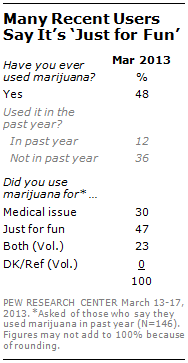
say they did so in the past year. The other 36% say they have tried marijuana, but not in the past year.
People who say they have used marijuana in the past year did so both for medical reasons and “just for fun.” About half (53%) of those recent users say that a medical issue was part of the reason for their use, including 23% who volunteer that they used marijuana for both medical and recreational purposes. The remaining 47% say they used marijuana just for fun.
More than half of young people (56%) say they have ever tried marijuana, and 27% say they have tried it in the past year – by far the highest percentage in any age category.
About half of those 30- to 49 (51%) and 50-64 (54%) have ever tried marijuana, although only about one-in-ten did so last year. Just 22% of adults 65 and older have ever used

marijuana, including 2% who say they have used it in the past year.
Men are more likely to say they have tried marijuana than women, 54% vs. 42%. Half of whites and blacks (50%) say they have ever tried marijuana, compared with 34% of Hispanics.
Democrats and Republicans are about equally likely to say they have tried the drug over their lifetimes, 47% vs. 43%; independents are somewhat more likely to have used it (53%). However, over the past year, more independents (14%) and Democrats (13%) than Republicans (7%) say they have used marijuana.
There is no significant difference in lifetime or recent use between people in states with some form of legalized marijuana and those in other states.
Half Would Be Uncomfortable around Marijuana Users

About half of Americans (51%) say they would feel uncomfortable if people around them used marijuana while 48% would not. Just 35% of those under 30 say they would be uncomfortable if people around them used marijuana, the lowest percentage of any age group. Twice as many of those 65 and older (74%) say they would feel uncomfortable around marijuana use.
More women than men say they would be bothered by people around them using marijuana. Nearly six-in-ten women (57%) say they would feel uncomfortable if people around them used marijuana, compared with 44% of men.
Parents are about as likely as non-parents to have ever tried marijuana and they have similar feelings about people using marijuana around them. About half of parents (50%) and non-parents (51%) say they would feel uncomfortable if people around them used marijuana.

Appendix: State Marijuana Laws
Only medical marijuana is legal: AZ, DE, DC, HI, MI, MT, NJ, NM, VT
Marijuana is decriminalized: MN, MS, NE, NY, NC, OH
Medical marijuana is legal and marijuana decriminalized: AK, CA, CO, CT, ME, MA, MS, NV, OR, RI, WA
Not decriminalized or medical: AL, AR, FL, GA, ID, IL, IN, IA, KS, KY, LA, MD, MO, NH, ND, OK, PA, SC, SD, TN, TX, UT, VA, WV, WI, WY
Source: National Conference of State Legislatures and National Organization for the Reform of Marijuana Laws, 2013.




